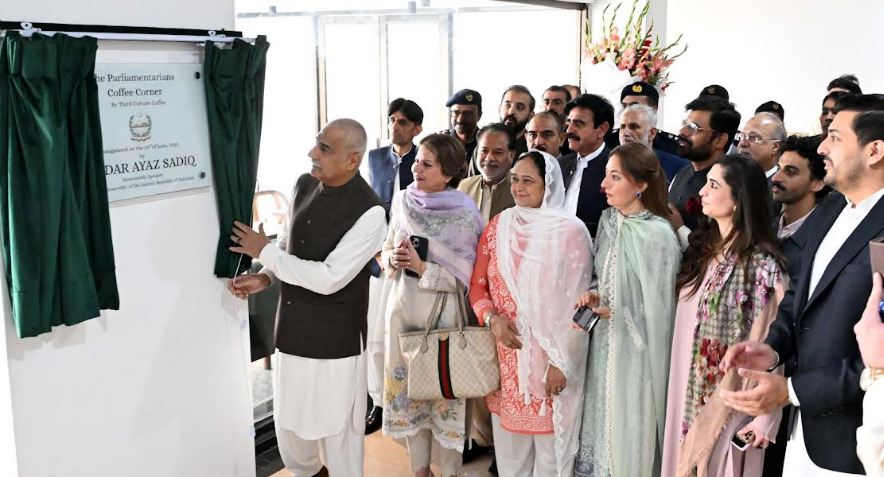by Muhammad Mohsin Iqbal
In the quiet dignity of parliamentary architecture, some ideas are born not merely in the chamber of debate but in the spaces in between—where minds meet without microphones and voices flow without formality. One such thoughtful innovation has taken root in the National Assembly of Pakistan under the visionary stewardship of the three-times elected Speaker, Sardar Ayaz Sadiq. More than a seasoned parliamentarian, he has consistently demonstrated a constructive and forward-looking vision for Pakistan’s legislature—not confined merely to laws and bills, but encompassing the ethos of dialogue, dignity, and inclusivity.

Among his many reforms—the installation of solar energy panels on Parliament’s rooftop and parking area, the creation of a Sustainable Development Goals (SDGs) Secretariat, an infant Daycare Centre for the children of women parliamentarians and staff—the establishment of the Parliamentarians Coffee Corner within the Parliament precinct stands out as an initiative both symbolic and practical. It may appear as a modest innovation, but in truth, it carries a profound message; that ideas are not always birthed in confrontation, but often in conversation.
The tradition of coffee and tea houses being fertile grounds for thought, dialogue, and even revolution is a well-recorded chapter in history. In 17th-century England, coffee houses became known as “penny universities,” where for the price of a cup of coffee, one could engage in intellectual debate with scholars, merchants, writers, and thinkers. Likewise, in France, the famed Café de Flore and Les Deux Magots in Paris bore witness to the musings of Sartre and de Beauvoir. In Vienna, the Kaffeehaus culture gave rise to the likes of Freud, Trotsky, and Wittgenstein, whose casual dialogues shaped profound revolutions in human thought. In the House of Commons of the United Kingdom, Members often frequent the Parliamentary Tea Room—not merely to refresh themselves, but to exchange informal views across party lines. Even the United States Capitol has its cafeterias and lounges where bipartisan consensus sometimes begins—not in the glare of the floor, but over a quiet cup.
Sardar Ayaz Sadiq’s vision of establishing a Coffee Corner in the National Assembly aligns with these traditions. In an age when politics is often marred by polarization and rancor, a place where legislators might sit face to face without cameras or scripts is not just a convenience—it is a necessity. Such a setting fosters civility, nurtures understanding, and allows the quiet diplomacy of listening to flourish. It is not hard to imagine a moment in the near future when consensus on critical national matters is born not in the roar of debate but in the murmurs shared over a warm cup.
Pakistan itself has a rich cultural history of intellectual cafés and tea houses that formed the backbone of its literary and political thought. The Pak Tea House in Lahore, once a haven for Faiz Ahmed Faiz, Saadat Hasan Manto, and Habib Jalib, was not just a place for tea, but a crucible of resistance and refinement. Journalists, poets, artists, and even parliamentarians frequented its wooden benches and smoke-laced air, where political ideology and poetry flowed in tandem. Shezan on The Mall, too, became a mid-20th century symbol of tasteful gathering—where refined conversation, not confrontation, defined the day. In Karachi, the famed Irani cafés once served as the democratic drawing rooms of the city. In Quetta and Peshawar, the hujras and chaikhanas served similar functions—where wisdom often came without titles and where decisions, though informal, shaped local narratives.
What Sardar Ayaz Sadiq seeks to do within the Parliament House is to restore a forgotten elegance to politics; the art of dialogue beyond the din. The Coffee Corner is not merely a place to sip; it is a place to reflect. It may serve parliamentarians their espresso or chai, but more importantly, it serves the democratic spirit a reminder—that the real strength of a Parliament is not in its building but in the relationships it fosters.
The other reforms introduced by the Speaker also follow this philosophy of care, progress, and inclusion. The solar energy project is not only a gesture toward environmental responsibility but a bold statement of self-reliance. The SDGs Secretariat brings Pakistan’s legislative body into global alignment with developmental goals that promise to uplift the most marginalized. The infant Daycare Centre stands as a monument of dignity for women legislators and staff, affirming that motherhood is not a hindrance to public service but a complement to it.
But of all these, the Coffee Corner carries an invisible thread—a thread of human connection, which, when woven well, becomes the fabric of parliamentary grace. As the world around us grows louder and more divided, spaces of quiet communion become rare and precious. In choosing to carve such a space within the heart of Parliament, Sardar Ayaz Sadiq has shown that leadership is not merely about commanding attention, but also about creating environments where others may speak, think, and even differ—with respect.
Ultimately, just as the poets of Pak Tea House once believed that “a conversation can change the world,” so may a conversation in the newly established Coffee Corner of the National Assembly offer the kind of thoughtful engagement that makes democracy not only functional but noble. For when parliamentarians begin to listen—not just debate—they also begin to govern better. And that, in any language, is the true aroma of progress.

















